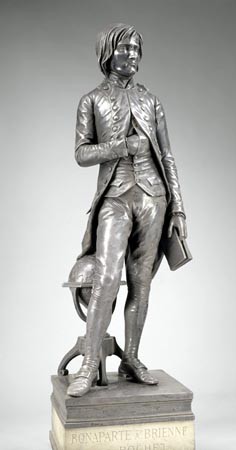To Monsieur Carlo Buonaparte at Ajaccio
Royal Military School, Brienne
12 October, 1784
My dear Father,
Your letter, as you can imagine, has not given me much pleasure; but the interests of your health and of the family are very dear to me and have forced me to approve your early return to Corsica, which has consoled me for everything.(Due to his state of health, Charles Bonaparte cancelled his planned visit to Napoleon and Lucien in Brienne before returning to Corsica with Joseph.) .
[Besides](word uncertain), being assured of the continuance of your kindness and love and your eagerness to help me in every way, how could I not be happy and content? I hasten to ask you for news of the effect the waters have had on your health and to assure you of my respectful devotion and eternal gratitude.
I am pleased that Joseph has gone to Corsica with you, provided that he is here on 1 November, or around about that time. Joseph can come here, because Father Patrault my mathematics master, whom you [know], is not leaving. Consequently the Principal(Father Louis-Sébastien Berton.) has told me to assure you that he will be well received here and can come with confidence. Father Patrault is an [excellent] teacher and has assured me that he will take charge of him with pleasure, and, if my brother is ready to work, we can take the [artillery] examination together… You will not have to do anything for me since I am a student. Simply it should be done for Joseph, but since you have a letter for him, everything is done.
My dear Father, for several reasons I hope you will place him at Brienne rather than Metz (Napoleon seems to have got used to the idea of his older brother’s change of vocation. In the end, Joseph did not go to Brienne or Metz.).
1. Because that will be a consolation for Joseph, Lucciano and me;
2. Because you will have to write to the Principal of Metz, which will take longer because you will have to wait for his answer;
3. It is not usual at Metz to learn in six months what Joseph must know for the examination; since my brother knows no mathematics, they would put him with the children which would [disgust] him. These and many other reasons should decide you to send him here;
especially since it will be [better]. So I hope that before the end of October I will kiss Joseph. Moreover, he may well only leave Corsica on 26 or 27 October, to be here the following 12 or 13 November.
Please send me Boswell’s History of Corsica [An account of Corsica(In 1768, the Scot James Boswell published a report on his trip to Corsica, entitled “An account of Corsica”, popularising the revolutions of Corsica and the character of Pascal Paoli (See also Antoine-Marie Graziani, Pascal Paoli, Père de la patrie corse, 2002, chapter X))] and other histories or memoirs concerning that kingdom. You need have no fear; I will take care of them and bring them back to Corsica with me when I come back [namely] in six years.
Good-bye, my dear Father, [Chevalier] (The chevalier was the youngest of a noble family, here Lucien.) embraces you with [all] his heart. He [works] well and did very well at the public exercise. The inspector (Reynaud des Monts. His agreement was required in order for Bonaparte to go on to the École Militaire in Paris.) will be here on the 15th or 16th of this month at the latest [namely] in three days. As soon as he has left, I will let you know what he [said] to me. Gives my respects to Milana (It is not possible to say precisely who this is. Whilst Minana means “grandmother” in much of Corsica and Napoleon’s paternal grandmother was Maria Saveria Pallavicini, she had died in 1749 or 1750. Her husband, Giuseppe Maria Bonaparte, remarried in 1750 to Maria Virginia Alata. This is more likely to be an “affectionate” term, as in “ziu” or “zia” (uncle and aunt), for a dear one.) Zaveria, Zia [Aunt] Gertrude (Gertrude Paravicini was Napoleon’s paternal aunt and godmother.), Zio [Uncle] Nicolino (Nicolo Paravicini, husband of Gertrude.), Zia [Aunt] Touta (Probably Letizia’s cousin.), Antoinette Benielli., etc. My compliments to Minana Francesca (Unidentified.), Santo (Unidentified.), Juana (Perhaps Giovanna Ilari, daughter of Marie Françoise Ilari, Napoleon’s wet-nurse or nanny.), Orazio (Perhaps Ignazio Ilari, son of his wet-nurse or nanny Marie Françoise and childhood friend.) etc… Please take care of them. Send me news of them and tell me they are happy. I end by wishing your health as good as my own. (Handwritten missive, French Archives Nationales, 400 AP 137.)
Your humble and obedient, V[ery] C[hristian] son,
de Buonaparte, l’arrière-cadet (Possibly meaning ‘second-born’.)


